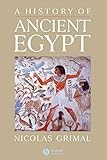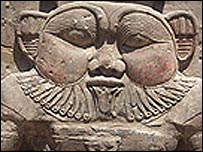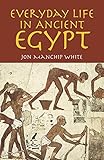By: The Scribe on April, 2007
 Execration texts were a type of Egyptian hieratic text, believed to possess magical qualities. Egyptian priests or state magicians would write the names of individuals or groups that were considered hostile or dangerous to Egypt on small statues or jars; these were then broken and buried, symbolizing the destruction of the enemy.
Execration texts were a type of Egyptian hieratic text, believed to possess magical qualities. Egyptian priests or state magicians would write the names of individuals or groups that were considered hostile or dangerous to Egypt on small statues or jars; these were then broken and buried, symbolizing the destruction of the enemy.
Pieces of these magical texts have been found near a number of tombs in Thebes, Saqqara, and the Nubian fortresses. One text near a fortress was written on a skull, which suggests that it may have belonged to an enemy – the capture, decapitation, and composition of the text on his skull was probably an attempt at magically transferring the fate of the one individual onto the entire enemy group.
Although execration texts were popular throughout Egyptian history, they were most frequently used during the New Kingdom. The example shown here is dated to the First Intermediate Period, and is currently on display at the Louvre. The statue’s missing arms were likely a deliberate attempt to magically ensure that the cursed enemy could not cause any harm.
Want to read more?


Tomorrow: Do do that Voodoo!

By: The Scribe on April, 2007
 In 2005, a team of researchers from Georgetown University Hospital put together a study of dwarfism in ancient Egyptian society, based on tomb and skeletal evidence.
In 2005, a team of researchers from Georgetown University Hospital put together a study of dwarfism in ancient Egyptian society, based on tomb and skeletal evidence.
Published in the American Journal of Medical Genetics, this study revealed that the ancient Egyptians not only worshipped dwarf gods, but many dwarfs also held prominent positions in households and royal palaces.
The study found that in at least 50 tombs, there were artistic depictions of dwarfs that followed similar themes, indicating that dwarfs were well-integrated members of Egyptian society. They often held the same social positions as those of average height, such as personal attendants, entertainment overseers, or prominent merchants. Some tomb depictions even showed dwarfs in elite positions, acting as attendants to high court officials – indeed; several extremely rich dwarf burials have been identified in the royal cemetery near the pyramids at Giza.
This respect for dwarfism may have arisen from the inclusion of two dwarf gods in the Egyptian pantheon: Bes (protector of childbirth and children), and Ptah (god of reincarnation). Statues and vase paintings of these gods – and other dwarfs – were prevalent in the Old Kingdom.
According to Dr. Chahira Kozma, a member of the Georgetown study, “wisdom writings and moral teachings in ancient Egypt commanded respect for dwarfs and other individuals with disabilities.” Clearly, dwarfism was not viewed by the ancient Egyptians as a physical handicap, and indeed may have enabled these individuals to achieve even greater success within their communities.
Want to read more?


Tomorrow: Origins of man’s best friend!

By: The Scribe on March, 2007

In late 2006, archaeologists digging at the Mut Temple in Luxor discovered a column dating to the reign of Hatshepsut, upon which was carved an inscription describing an ancient Egyptian New Year’s festival called the “Festival of Drunkenness”.
Celebrated in honor of the goddess Sekhmet, the whole point of the festival was: get completely and totally smashing drunk, have a lot of sex, pass out… and then – hopefully – wake up the next morning to the sounds of blaring music. Some of the inscriptions make reference to “traveling through the marshes” which, according to site excavator Betsy Bryan, was an ancient Egyptian euphemism for having sex. This connection was also reinforced by ancient graffiti in the temple depicting men and women in various ‘positions’.
The inscription also included reference to several regulations for the festival, the most notable being a call for select individuals to make sure they remained sober – like ancient designated drivers, Bryan explained – to ensure everyone was participating safely and to prevent revelers from unintentionally causing harm.
After a night of drink, dance, and sex, musicians would walk around the festival grounds and play drums to wake up the participants. It was at this point – somewhat still inebriated and groggy – that the Egyptians believed they could communicate with the divine, and would ask the gods for their blessing and favor on the local community in the coming year.
Want to read more?


Tomorrow: Ancestors of the Inca

 Execration texts were a type of Egyptian hieratic text, believed to possess magical qualities. Egyptian priests or state magicians would write the names of individuals or groups that were considered hostile or dangerous to Egypt on small statues or jars; these were then broken and buried, symbolizing the destruction of the enemy.
Execration texts were a type of Egyptian hieratic text, believed to possess magical qualities. Egyptian priests or state magicians would write the names of individuals or groups that were considered hostile or dangerous to Egypt on small statues or jars; these were then broken and buried, symbolizing the destruction of the enemy.
 In 2005, a team of researchers from Georgetown University Hospital put together a study of
In 2005, a team of researchers from Georgetown University Hospital put together a study of 


